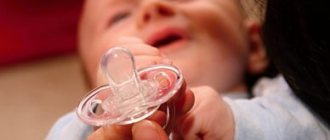Probability of danger of development of pathological processes
This behavior is dangerous when children are sick or suffer from pathology.
At the initial stage of treatment, this is normal, because the medications have not yet begun to actively work. If therapy has been going on for a long time, and the moaning continues, you need to contact a pediatrician who will change the medications or prescribe an additional examination. Otherwise, there is no cause for concern. After the examination, the doctor will give recommendations on what to do next. If this is a nervous disorder, then you will need to consult a neurologist.
To ensure your child gets a good night's rest, pediatricians recommend:
- before going to bed, bathe him in a light decoction of chamomile with a couple of drops of lavender oil;
- lavender can be placed next to his crib;
- a walk in the fresh air should become a good habit for parents;
- Don’t put her to bed hungry, but don’t overfeed her either.
If the little one reacts to noise and light, do everything so that it does not bother him. What you definitely shouldn’t do is panic or ignore the child.
Many mothers listen to the opinion of the popular television doctor Komarovsky: “Sleeping a lot is natural for a newborn. Another major need at this age is nutrition. Therefore, rest and food are interconnected, and the regime is often based on the baby’s need for food. Don’t force it, it’s better to adapt to the child and his desires. Some doctors recommend strictly observing a 3-hour interval between meals and 6 hours without eating at night. Demanding discipline from a child at this age is stupid. Now he is driven by instincts that will not leave him hungry or not rested. Sleep is even more important to him than nutrition, so you shouldn’t wake him up for scheduled feeding.”
Practical tips:
- reducing the temperature in the room where the child sleeps (the norm is 18-21 degrees);
- comfortable sleeping place (no newfangled pillows, only a medium-hard mattress);
- comfortable clothes for sleeping;
- Daytime rest is best spent outdoors;
- don’t rock, many children get rocked and feel bad in their sleep, that’s why they moan;
- You can let him fall asleep in your arms, and then carefully put him in the crib, but it’s better to lie down next to him without teaching him to use your hands.
Why does a 5-7 year old child wake up at night and cry?
Many parents are faced with a situation where a child around 5 years old wakes up at night crying or hysterical. And when such situations recur periodically, adults begin to seriously worry about the baby’s condition. Let's figure out why he's still crying? And what to do with it?
Reasons for crying when waking up at night
- Medical and neurological causes: tummy (diarrhea, worms), vaccination, cramps (lack of vitamins), restless leg movements, intracranial pressure, weather sensitivity, high temperature and delirium due to a painful condition. To exclude medical causes, you should consult a pediatrician and neurologist.
- Discomfort during sleep : sweating a lot (take care of the sleeping conditions, in particular the ventilation of the room), resting an arm or leg (may be afraid that part of the body cannot feel), there may be growing pains (the skeleton is actively forming - warm baths, stroking will help , relaxing massage).
- Excitement or overwork the day before : the nervous system is not yet strong enough to cope with the load and emotions that overwhelm (help the baby cope with emotional shock, teach self-regulation and effective ways to express their feelings - talking, discussing with an adult, playing, physical exercise, creativity, dancing).
- Stress or fear during the day : conflicts in the family, loud screaming, extreme heat, moving, an aggressive animal, a frightening scene on TV. Sleep is a reflection of how the baby spent the day. Adults can help children calm down, spend a pleasant and quiet time before bed, increase the time of rituals for falling asleep, add more relaxing activities (massage, stroking, bathing in warm water).
- Nightmares and fears : it is difficult for a child to understand that this is not happening in reality. It is also important to consult a neurologist to clarify the functioning of the nervous system.
Let's take a closer look at nightmares and fears, which begin at the age of 2-3 and occur in a third of people.
NIGHTMARES
A nightmare is a bad dream, usually in the second half of the night in the REM phase of sleep (when dreams are intense), followed by crying and complete awakening, while children remember the dream, try to tell it to an adult and find protection.
Children see the world in images. Nightmares arise from frightening images (for example, seeing a tiger on the wallpaper during the day and being afraid), which an adult may not pay attention to.
It is important not to discount this and discuss with your child what he is afraid of: what it is, what it looks like, what scares him and why.
How to recognize nightmares?
- Please note that if a child sleeps with a toy, does not let go of it and throws a tantrum without it, then something is probably bothering him greatly and he needs this object as protection.
- Scary stories at night or watching TV (and you can’t know exactly what might frighten your baby) cause an increase in the level of stress (cortisol) in the body, which disrupts children’s sleep.
- If your child, starting in the morning and throughout the day, asks “Are we going to sleep? And where? Will you be with me?”, most likely he is afraid.
How to help with nightmares?
- Before working on improving sleep, it is important to first work with frightening images, since cortisol and adrenaline interfere with establishing sleep initially: help the baby cope with fear or consult a psychologist .
- At the moment of awakening, approach the child and help him calm down : pet him, hug him, explain that it’s a dream, it’s over and now everything is fine, offer some water or a favorite toy. In such situations, it is better to stay with the baby until he completely falls asleep.
- "Spray for fear." Pour some water into a bottle with a diffuser (sprinkler) (you can add a drop of essential soothing oil, but the aroma should not be strong, otherwise it will interfere with sleep).
Tell your child that this magical spray for fears was given to you by the Sleep Fairy (your favorite character from a fairy tale cartoon). Explain that when he is afraid, you will disperse evil monsters (or whatever he is afraid of) with this spray! - Night light toys . You can find it in our online store “Sleep Products”.
- Convince the defense .
Children often ask their parents, “Will you protect me?” We always answer “Yes, of course!” Anytime! Even when you're sleeping! This is important for the little person’s sense of security.
NIGHT FEARS
Night terrors or terror (refers to disorders of awakening from slow-wave sleep) is a special condition during awakening at night (usually 2-3 hours after falling asleep), when the child wakes up hysterical and is difficult to calm him down. There is often a genetic predisposition (one of the relatives also suffered from similar episodes in the first half of the night).
How to recognize night terrors?
- It’s as if the child has been replaced: he wakes up in hysterics, screams, rushes around the bed or sits in the corner, and can throw things, even hurting himself.
- Autonomic changes: the baby has a rapid heartbeat, trembling, he is all wet from sweat, and is breathing quickly.
- Pushes away from mom and dad: the eyes may be wide open, but the child does not recognize the parents and says something incomprehensible.
- This lasts from 5 to 40 minutes.
- He can then fall asleep in the place where he calmed down.
- In the morning he remembers nothing about it.
Similar episodes sometimes appear before the age of 3: from the age of 1, the baby roars when waking up, the breast does not want, does not want anything, does not ask to be held, does not calm down for a long time - this can also be about night terrors.
Causes of night terrors
Often the cause is a freeze between sleep and wakefulness when emerging from deep sleep. We all partially wake up at this moment, but in children, due to the highest intensity of deep sleep, this transition from phase to phase does not always go smoothly.
It is also generally accepted that in such children the child’s brain matures in a special way. Somnologists believe that the cause of night terrors is the amygdala, which is activated in the brain and is responsible for panic.
But 4 possible reasons for activation may be the following:
– intoxication (poisoning with harmful substances); – viral infection; – increased activation due to cortisol-adrenaline (therefore it is important to exclude irritants before bedtime);
– often adenoids (a situation of hypoxia, a state that he cannot breathe, and this frightens the baby, he does not understand what is happening and panic arises).
How to help with night terrors?
- Usually they do not treat, but help create a safe environment. By the age of 7, such nighttime episodes become less frequent and pass by adolescence on their own - the brain matures, the nervous system strengthens.
- In the morning, the baby does not remember his nightly hysteria; adults do not need to remind him of this, so as not to impose this state and not frighten him even more.
- Ensure safety during this nighttime episode (remove sharp corners, exclude beating or stabbing).
- In such situations, it is quite difficult to wake up the baby and influence his actions. He does not understand what is happening to him and does not control his actions. It is better not to touch during a hysterical moment, not to shake, and to exclude physical contact. Just be there and wait it out.
- Mom can calm her down with a gentle voice (the child may not hear what the adult is saying, but he calms down from his mother’s voice, so the mother must control herself and console the baby in a calm voice).
- Sometimes rousing helps: for example, if hysterics are at 2:00 am, then wake up the child at 1:50 am, take him to the toilet to disrupt the sleep phases - this may help, but not always.
Prevention of cough during sleep in a child
The following tips will help prevent night coughs.
- Cleanliness of hands and face. Develop the habit of washing your hands after going outside and before eating. Also, prohibit him from touching his face or putting dirty hands in his mouth during walks.
- Proper nutrition is the basis of immunity. Eliminate chips, crackers and other junk foods from your child’s diet. In addition, monitor the amount of sugary foods your child consumes. Excessive amounts of sweets are harmful to health and can cause allergies. Also, you should not eat a lot of fatty, sour and overly salty foods. All this provokes the appearance of cough at night. The child is recommended to consume fresh vegetables, dairy products, cereals and soups.
- Vaccination. Vaccinate your baby according to the vaccination plan from your doctor.
- Physical activity. In order not to get sick or cough at night, the child should move or play outdoor games.
- Daytime sleep. An afternoon rest restores strength and strengthens the immune system.
- Daily regime. Getting up and going to bed at the same time supports normal immune system function. Therefore, the child needs to go to bed and get up at the same hours.
- Ventilation of the bedroom. Open the window in your child's room before going to bed. It has been proven that you sleep better in a cooled room. And good deep sleep eliminates the occurrence of night cough.
A child's cough during sleep can indicate many serious illnesses. However, treating a cough without knowing its causes is fraught with consequences for the child’s health. A qualified doctor should find out the cause of night cough using preliminary diagnostics. He should prescribe treatment that will help prevent complications. However, it is better to prevent coughing and engage in disease prevention.
Be healthy!
Video on the topic:
source
How to calm a bad cough at night
These methods will help you feel better and sleep well until the morning. Some parents, without a doctor’s testimony, are at a loss and do not understand how to carry out treatment or at least alleviate the condition. So, you should call an ambulance during a coughing attack if it is accompanied by the following signs:
- strong increase in temperature;
- whistling when coughing;
- coughing up blood;
- cough with vomiting;
- complaints of severe pain;
- appearance of rashes.
If there are no symptoms listed above, then you can use the tips described above and wait until the morning. The famous pediatrician Komarovsky says that cough is the body’s defense, so it is necessary to establish its cause and treat it first. But at the same time, do not forget to relieve coughing, which causes severe discomfort. This is very easy to do by drinking plenty of fluids and frequently airing the rooms.
If a baby cries and moans...
Every normal mother is very worried when her infant begins to behave restlessly at night, makes extraneous sounds and noises. This is alarming and greatly affects the nerves and mood. But don’t worry too much, because, as mentioned above, in most cases the reasons for such manifestations should not worry parents in any way. This is a normal reaction of the body to the changes occurring in it, the processes of adaptation and development.
It also happens that parents begin to put their child to bed separately, and this causes his resistance and crying. Everything is quite understandable, because it is quite difficult for him to tear himself away from his mother, and separation, even during sleep, causes bitterness and negativity, which is expressed by screaming or crying. Therefore, before placing the child separately, you can let him fall asleep next to you, and only then transfer him to the crib.
And it also happens that a child moans at night because of positive emotions. After all, even at night, in the stage of rest and break from work, the brain continues to process the information received during active wakefulness. Fun events, games, parents come to mind. The baby begins to smile and giggle cheerfully. For parents, this is a very funny and pleasant sight, which is not a sin to even capture in a photo.
Baby sleep stages
Before identifying the factors that cause moaning, it is important to familiarize yourself with the stages of sleep:
- Deep. The baby sleeps calmly, practically does not move, but the muscle tissue is tense. This stage of sleep is characterized by the production of growth hormone.
- Active paradoxical. It seems that the baby will wake up soon: a smile appears on his face, his limbs tremble.
- Nap. Half-sleep period: the baby did not wake up, but the slightest sound or touch can wake up.
- Awakening. Calm awakening - the child is drowsy, the reaction is slowed down. Active - the baby may cry. Excited - the baby cries hysterically, it is difficult to calm him down.
Common sleep disorders in young children
Young children are more likely to suffer from such sleep disorders.
- Speaking. Babies can talk during shallow, superficial sleep. With such manifestations, no treatment is required.
- Insomnia. It is difficult for a child to fall asleep (especially if he is left alone in the room), his body is not able to maintain optimal sleep patterns. The baby wakes up several times during the night, whines, is capricious, cries, and calms down only when mom (or dad) takes him in her arms and rocks him to sleep. Some babies need their parents to be nearby while they fall asleep. This is due to the fear of loneliness. Insomniac sleep disorders in a child also include refusal to go to bed at a certain time, as well as eating disorders (violation of the meal schedule).
- Fears. If a small child experiences fear in a dream, he screams and wakes up at the same time. Other negative emotions may also appear from fear. Night terrors appear mainly in children of senior preschool and primary school age. They are associated with the emotional experiences that the baby has experienced over the past day.
- Bruxism. The problem associated with grinding teeth during sleep is more common in preschool boys. Some pediatricians associate this pathology with an unfavorable environment in the family where the child is being raised.
- Snore. When young children snore in their sleep, it can be a symptom of various health problems. If such manifestations are observed by parents of an infant, they should quickly take their child to the doctor.
The sounds that a small child makes in his sleep are not always a sign of pathology or health imbalance. Parents should consult their pediatrician about this to rule out the possibility of developing serious illnesses.
Moans in children from one to three years old
Why do children from one to three years moan? If such a problem has not been observed before, then most likely the provocateur is of psychological origin. Closer to 1.5 years, children's waking time increases significantly. In addition, every day the brain accumulates a large amount of information, which is sometimes difficult to process. As a result, the body becomes very tired.
In addition to the problem described above, night moans can be provoked by a number of other provocateurs:
Children's experiences often result in nightmares. This condition is called in medicine as rest regression in children. This problem is temporary and disappears as soon as the stage of mental adaptation is completed.
Regression occurs 3 times:
There is no need to be afraid of such a state. As a rule, absolutely all children go through them, since it is a natural process. During these periods, the main task of parents is to establish a friendly atmosphere in the house. When all three stages have passed, the child's sleep will normalize, the child will stop moaning and waking up at night.
Why does it occur
Poor sleeping position can also cause persistent coughing. If the formation of sputum and mucus is observed, then this is a sign of a certain disease.
Respiratory diseases
This is the most common cause of cough. This disorder is accompanied by damage to the respiratory organs.
A runny nose causes mucus to move down the nasopharynx. This leads to irritation of the back of the throat. This process is accompanied by soreness, pain and coughing.
It may be a sign of bronchitis and pneumonia, which are complications of respiratory diseases. Mostly occur in the absence of drug therapy.
Allergic attacks
In this case, the child develops a cough without fever at night. Allergy is an insidious disease. The initial stage can easily be confused with the development of a cold or ARVI.
A strong, suffocating appearance may be a sign of bronchial asthma. This is accompanied by shortness of breath, difficulty breathing
It is important to provide your baby with timely medical care to avoid suffocation.
Worm infestation
The presence of helminthic infestation is a common phenomenon in childhood. In this case, the child develops a constant cough at night. This is due to the fact that helminths become more active at night.
Also, helminths begin to actively reproduce. The amount of their waste products increases. They are toxic to the human body.
Helminthiasis is similar to the manifestations of colds and allergies.
The larva moves from the intestines into the stomach, and from there into the lungs. Then it passes into the bronchi, where it causes irritation. This provokes an attack.
The larva enters the oral cavity with sputum, and then with saliva back into the gastrointestinal tract.
It is worth considering that adult roundworms tend to leave the body through the respiratory tract.
In small children this may cause suffocation.
Teething
Teeth erupt in babies under 2 years of age. In this case, increased salivation occurs, rhinitis with the release of clear mucus.
Presence of a foreign body
This reason is quite dangerous not only for the health, but also for the life of the baby. A child may develop a cough when falling asleep.
A foreign body can be any object: elements and parts of toys, coins, buttons. You can only get rid of this in a hospital.
An older child can independently admit that he has swallowed an otherworldly object. In babies this is accompanied by crying, refusal of drinks and food, and irritability.
Sometimes your body temperature may rise. If you experience such symptoms, you should immediately seek help from a medical facility.
Problems with the gastrointestinal tract
The main gastrointestinal disorders that provoke coughing include gastroesophageal reflux. It occurs very often in children of all ages.
Accompanied by characteristic symptoms:
- pain;
- weight loss;
- loss of appetite;
- pale skin color;
- nausea;
- heartburn.
Correct actions of parents
If it happens that a young mother and father are faced with the fact that their child is moaning in his sleep, they need to quickly look for the reason for this condition of the baby while he is resting at night.
After examining the baby, the pediatrician must explain to the parents why the child’s behavior is undergoing these changes. If we remember that the baby’s moans can be directly related to nervous disorders, then the right solution would be a visit to a neurologist.
To ensure sound and healthy sleep for young children, it is enough for parents (in most cases) to eliminate all possible causes as follows:
1. Before putting the baby to bed, give him a rest, try to occupy him with a calmer game than during the day.
2. The room in which the baby is supposed to be put to sleep must be well ventilated.
3. To create a sense of security for the baby, you need to sing him a lullaby or read a fairy tale.
In addition, we should not forget about one more “secret weapon”, such as the closeness of the closest person for each baby - the mother. Her love and care are quite capable of protecting the baby from all kinds of anxiety in her sleep.
A calm and sound sleep is the key to the health of any baby, but what to do if a newborn moans in his sleep?
Many mothers are afraid of this. In the cozy mother’s belly, the little one was comfortable and safe, and the new world for him was full of secrets and mysteries. It’s not at all easy to adapt to it, and moaning in your sleep can be the baby’s reaction to these changes. But more about everything.
Children's moans during sleep and their main reasons
When tiny children do not sleep soundly and serenely, but toss and turn and behave restlessly, this is alarming. Every parent wonders why the baby moans in his sleep, what is the reason for this, is there any reason for concern? Sometimes there are signs of unpleasant, frightening dreams. Most parents do not even suspect that infants also have visions. What children see while dozing can be mischievous, funny, or irritating and upsetting. When a newborn moans in his sleep, sniffles loudly, grunts, and makes loud sounds - these are emotions that arise as a result of nightmares and funny visions.
If parents, favorite animals, brothers, sisters come to a child in his dreams, he gurgles and laughs. The sounds he makes, the emotions he experiences, are similar to those during the game in reality. Dreams in which the baby sees unpleasant, frightening pictures make one experience negative emotions. That's why the baby cries and groans.
At the scientific level, other factors have been identified and proven why a tiny person grunts during a nap. The child moans in his sleep reasons.
- Teething. After birth, children grow rapidly, surprising those around them with discoveries every day. In addition to growth, development, and the formation of new skills, children develop teeth. This process gives infants and parents a lot of anxiety. Children become capricious, irritable, refuse food and favorite toys, and put objects in their mouths. Sleep is disturbed and becomes restless. When a year-old child groans in his sleep, this is associated with teething, ease the suffering - use teethers, lubricate the gums with special products that relieve itching and pain.
- Pain in the stomach. A newborn baby groans during the rest period due to discomfort in the stomach and intestines. The gastrointestinal tract does not function smoothly, gases do not pass away. After feeding, babies develop bloating and intestinal colic. To relieve infants from such symptoms, place them on their tummy before meals, carry them in an upright position after meals, and give them a massage. Gases will not accumulate, the baby will feel at ease, the rest will be calm and comfortable.
- The baby was born ahead of schedule. Babies born prematurely have difficulty adapting to new environmental conditions. The child moans at night in his sleep. With proper care, premature babies recover, gain weight, and the body adapts to existence in new conditions.
- The stages of dreams change. Little children absorb like a sponge. They are impressionable, learning about the world around them brings a lot of emotions. Emotions accompany him in his drowsiness, manifesting themselves in twitching of arms and legs, laughter, and crying. A one-month-old baby moans in his sleep - this is considered a transition to a new phase of sleep.
Parents of infants perceive deviation from calm behavior during the dream period as a cause for concern and look for the cause of the phenomenon. There are a lot of reasons to be nervous and worry about the health of your beloved child. Pediatricians recommend not to panic. The manifestation in children of different age categories is a physiological feature that will go away over time. A new little person explores the world around him, receives new emotions, impressions from what he sees, and struggles with emerging difficulties.
When babies are born, they find themselves in a new environment, which is stressful for them. Gradually, life in such a rhythm and environment becomes natural, and the small organism adapts to the prevailing conditions. When the adaptation period has passed, the newborn becomes calmer, a routine and daily routine are formed.
There are situations when children are emotional and make various sounds from an excess of positive emotions. Brain activity is no less active during the dreaming hour than during the waking period. Emotions and information obtained in the process of active cognitive activity are processed. Babies record in their memory memorable moments of play, fun, interesting pastime with loved ones. During the process of rest, these moments emerge in memory. While replaying significant moments, the children laugh, walk, and smile.
The inextricable connection between babies and mothers has been scientifically proven. If parents put the baby to bed alone, he may unconsciously react with anxiety and whims to the absence of his mother nearby. To eliminate anxiety and negative manifestations in babies, put them to bed with you, sing lullabies, caress them, and lull them to sleep. After making sure that the babies are sleeping soundly and peacefully, put them in the crib and get down to business.
Why do babies moan?
Newly born babies spend a lot of time hibernating. Newborns sniffle, grunt, moan, and make sounds while dozing. This is explained by an excess of emotions and stressful situations that arise in the process of adapting a small organism to the conditions of the surrounding world. Having been born, they find themselves in a strange, unfamiliar, frightening environment. Babies are deprived of their usual coziness and comfort that surrounded them in the womb. The ambient temperature is lower than during development in the mother's body, efforts are required to get enough, every trip to the toilet brings discomfort and unpleasant sensations. Children cannot adapt to the fact that they have to stay in a crib for a long time, and not in the weightlessness of amniotic fluid.
Children have an immature, unformed psyche. Emotions and impressions are difficult to perceive, digest, and assimilate. Moans, grunting, screams at night are a psychological release.
It is believed that the little man is most relaxed at the moment of dozing. The body is actively growing. You can see how little children shudder, twitch, sniffle, and moan while resting. This is not a pathology, but a normal phenomenon. There is no reason to go to the doctor and look for non-existent diseases.
There are a number of reasons why a newborn moans while dozing.
- The swaddling method chosen by the parents restricts movement. In the early postpartum period, babies have vigorous motor activity with their limbs. Doctors advise young parents to swaddle their babies to prevent them from injuring themselves. Too tight swaddling causes anxiety due to the inability to move arms and legs. Newborns are uncomfortable and ill during the period of napping; they resist, showing dissatisfaction with groans, sniffles, and grunts.
- Discomfort due to overfilled diapers, wet diapers. Children's dreams are very strong and serene. Children go to the toilet directly in their sleep, involuntarily. Overfilled diapers and wet diapers cause discomfort and cause anxiety. Each baby expresses it differently.
- Uncomfortable position. The change from the feeling of soft weightlessness of amniotic fluid to a hard crib causes dissatisfaction and irritation in babies, which manifest themselves in restless rest.
- Feeling hungry. The desire to eat displeases the baby, who demands food, making sounds through his drowsiness. Follow the regime, do not put your baby to bed on an empty stomach.
- Lack of fresh air. If a baby falls asleep in a room with heavy, dry air, he will begin to choke, moan, groan, and toss and turn. Ventilate the room before putting your baby to bed.
- Pain, cramping in the tummy, intestines. Due to the accumulation of gases, intestinal colic and cramps in the tummy occur, which do not allow babies to sleep fully and peacefully. The intensity of the manifestation of emotions depends on how severe the pain is bothering the baby.
- Negative dream plot. When a month-old baby moans during dreams, this is associated with negative emotions caused by bad, negative, frightening visions. The little ones moan, sob, cry, scream.
- Anxiety due to unpleasant, painful conditions. It’s not just intestinal colic and abdominal pain that disrupt your rest. Infants cry and groan in their drowsiness because of the appearance of teeth, if they have a cold in their ears. Pain and discomfort will not allow the baby to fully rest.
- Noise in the room. If there is noise, loud voices, TV sounds, music in the room where the baby sleeps, he will not be able to sleep peacefully. Loud sounds help to stop dreams; the baby will be restless and may moan, toss and turn, cry, and wake up.
- Extreme fatigue. If children are tired while they are awake, they cry, moan, and grunt when they sleep. Regardless of night or day rest, he will be restless. The kids wake up, can’t get a good night’s sleep, are capricious, and upset.
If a child moans in his sleep, parents should watch their child. If the cause of the symptom is discomfort caused by the environment or the appearance of teeth, medical attention is not required. Ventilation of the room, timely feeding, changing diapers, tummy massage, as well as tactile contact and parental attention are required. If this phenomenon is accompanied by a cough, nasal congestion, loose stools with an unpleasant, pungent odor, or a rise in temperature, seek medical help.
It is necessary to listen to how the baby sleeps and analyze why manifestations occur. More often they do not entail consequences, but cases cannot be ruled out when the symptoms are harbingers of pathological changes in the baby’s health.
Why do babies 1-3 years old moan in their sleep?
A 3-year-old child groans in his sleep due to the fragile and overly sensitive child’s psyche. She is exposed to stress due to a mass of new emotions, impressions, information in the process of learning about the world around her. As the little man grows up, the period of dreams shortens, he is more active. The baby manages to learn so many new things, receive such a charge of emotions that he needs psychological release. Brain activity does not stop during sleep. Children of this age category develop fears, which, combined with increased fatigue and a huge amount of new information, lead to anxiety and irritability during dreams. Children make sounds in hibernation, shudder, sob, moan. This pattern of behavior in children of this age category is scientifically designated by the concept of “sleep regression.” Children sleep less at night. Sleep becomes superficial, anxious and restless. The order of alternation of phases, duration of periods of active pastime, and rest are disrupted. Failures occur between the ages of one and two years, when a new stage of child development is observed. Such phenomena are not considered precursors of pathological changes in the body. Parents should not panic and get upset; they need to be patient and go through this stage of their child’s life. If love and mutual understanding reign in the family, and parents strive to create conditions for the normal growth and development of the baby, frightening manifestations will soon disappear.
Sometimes regressions do not disappear quickly. The period of frightening manifestations is prolonged. Parents are worried that their children sleep restlessly, cry, sob and shudder. If such phenomena do not leave the baby for a long time, and at this age children should spend most of their time sleeping, it is worth consulting with your doctor for reassurance.
Children between the ages of one and three moan in their sleep for a number of reasons.
- Increased fatigue. Babies in this age category are already learning to walk. They are interested in everything, they strive to spend as much time as possible on their feet. This contributes to fatigue and muscle tension. During rest, children are often bothered by pain in the limbs, muscle twitching, which causes discomfort, causing babies to cry, moan and groan.
- Psychological overload. As children grow up, they tend to learn new information and acquire new knowledge and skills. This cannot but affect the emotional state of the baby. When children study many new objects, a large number of unfamiliar toys, strangers appear in the child’s life, his psyche is subject to stress. Such stress, combined with general fatigue, leads to headaches, tachycardia, insomnia, and the formation of phobias. Children become capricious and irritable during the active period and restless during rest.
- Inappropriate position. When children learn to walk, they spend a lot of time moving. As a result, they fall asleep in an unnatural position, for example, sitting on a potty, or lying on a chair. Parents should make sure that their babies sleep in their bed in comfortable, comfortable clothes, especially for rest.
- Formation of age-related phobias. Not all objects and phenomena are open and understandable for children. A large number of phenomena and objects for which children cannot find an explanation cause them fears and fears. Children aged 4 to 6 years are most susceptible to developing phobias. When phobias begin to haunt children during rest, they react with physical activity and various sounds. Little ones often wake up, jump up, start crying, screaming, calling mom and dad. The task of parents is to calm the baby, lull him to sleep, and feel sorry for him. If your baby is afraid of the dark, turn on a dim, not bright light. Panic attacks decrease by the age of four; by the time the child goes to school, they completely disappear.
- Unfavorable atmosphere in the family. Conflicts, quarrels, and loud swearing can provoke moans and screams during dreams. When there is a tense atmosphere within the family, children perceive this situation very painfully. A manifestation of internal experiences is moaning and crying during dozing. Such emotions, in an unfavorable environment in the house, appear already from the age of one and a half years. Kids don’t understand why adults, such close people, swear, raise their voices at him, what he should do. The baby is worried, upset, nervous tension results in anxious sleep, developmental delays, and mental instability.
In the vast majority of cases, children between one and three years of age make various sounds during dreams due to mental stress and general physiological fatigue. This is the norm.
Similar manifestations are observed in children who go to nurseries or children's development sections. When a baby is surrounded by a large number of new children and actively plays with everyone, he is constantly excited. New skills and communication experience contribute to hyperactive brain and mental activity. As a result of overexertion, children sleep poorly, moan and groan.
We recommend reading! Click on the link: Methods for getting small children to fall asleep independently
What to do if the cause of moaning is a pathological process in the body?
Moans during dreams and grunting may hide serious problems. The accompanying symptoms of the disease will not be hidden from the eyes of a caring, sympathetic mother.
Parents and the baby are required to go to see a doctor if, in addition to disturbing dreams, he has the following manifestations:
- rise in temperature;
- intermittent, uneven breathing;
- increased sweating during rest;
- swollen lymph nodes (causes pain);
- paroxysmal, suffocating cough;
- rash, pigmentation of the skin of unknown etiology;
- redness, enlargement of the tonsils;
- vomiting, upset stomach, intestines, frequent, loose stools mixed with mucus and blood;
- pain in the stomach, accumulation of gases in the intestines.
Moms and dads should not ignore interrupted, restless sleep with periodic groans, awakenings, and jumping up. In children, such symptoms may serve as signs of a disorder of the nervous system.
Signs of mental disorders and neurological diseases are diagnosed at birth. There is a high probability that they will be detected by attending physicians during regular preventive examinations. There are a number of specific mental disorders that are diagnosed when children reach a certain age.
Children with pathologies of mental development often get angry for no reason, are irritable, and do not have communication skills with peers. They do not develop according to age norms. If parents notice nervous tension, anger, aggressiveness, irritability for no apparent reason, contact a neurologist at the place of observation.
Is it dangerous for a newborn to moan during sleep?
It's not uncommon for babies to moan in their sleep. Mothers begin to worry that these are health problems. Before such frightening thoughts, it is better to thoroughly understand why the baby moans in his sleep. You need to start with the signs of restless sleep:
- moans and other disturbing sounds;
- the child tosses and turns;
- jerks arms or legs;
- often wakes up.
Most of all, young mothers are frightened by incomprehensible sounds, and completely in vain. Most often they do not pose any threat. But you shouldn’t ignore them when the mother’s heart is restless. The new world evokes even in a baby a sea of emotions, which he continues to experience in his sleep and groan because of it. If the child is active and calm while awake, then his moaning in his sleep is not dangerous. But if a breastfeeding baby is lethargic during the day and begins to moan during sleep, then he needs to be shown to a doctor to make sure he is in good health.
Baby's sleep: biology and sounds
The first time after birth, the toddler goes to sleep when he gets tired. It's hard to put him to sleep against his will. And if this happens, then a quiet rest is a rarity
It is also important that feeding should be frequent, approximately every 2 hours, for some a little longer. Therefore, the baby will often wake up, and this is a completely natural phenomenon.
Young parents mistakenly believe that the baby should sleep all night, and this rest should be calm and sound. In fact, the baby spends about 5 hours on this. Afterwards, he begins to groan and demand food. You shouldn’t forcefully wake him up to feed him; let him wake up on his own and want to eat. It is normal for a newborn to make different sounds during sleep, and this is not only a groan, but also grunting, light cries, and smacking.
Many mothers, being frightened, wake up the comb and this is wrong. Doctors believe that it is quite natural for a newborn to moan and cry in his sleep. So, he experiences the negative emotions that he experienced while awake and removes them from his consciousness. Sometimes this is a test of parents: are they nearby, will they provide help. This scanning function of sobbing and groaning is inherent in nature itself, so you shouldn’t worry about them.
Toddlers up to one year old often wake up and immediately fall asleep. This is also normal. Even when the baby sobs in his sleep and twitches slightly, this is also the norm. And this is due to an unformed nervous system. The older the child becomes, the less manifestations of nervous excitability he has, which means his rest becomes more relaxed.
Stages
A newborn baby's sleep has 2 phases:
- Active;
- Calm.
Literally on the third day, active sleep transforms into the rapid stage. It is this stage that makes up 45% of the child’s total sleep. Thanks to it, the little person’s brain grows and develops; it also acts as a protective barrier to negativity and helps relieve stress.
By three months, restful sleep turns into slow sleep, which is possible only with sufficient brain formation. Later, children begin to sleep in deep sleep, which is much deeper for them than for their parents. They need 20-30 minutes to completely restore energy in the body and charge the immune system.
The child moans due to illness
Why is it important to take any manifestations of restless sleep seriously? Minor disorders go away on their own, but sometimes they can act as the “first signs” of dangerous pathologies.
The quality of sleep is disrupted in the first two days of illness. Why is this happening?
Infectious diseases have a so-called prodromal period, when the body is already sick, but has not yet had time to fully respond. Clinical symptoms appear the next day, but at the moment there is intoxication - the production of toxic substances by pathogenic microorganisms. They stimulate the nervous system and brain structures responsible for falling asleep.
Suspicious symptoms
It is difficult for parents to decide on their own whether their son or daughter needs emergency care. Therefore, it is better to consult a pediatrician if the child begins to moan in his sleep.
It is necessary to sound the alarm and immediately contact a specialist when the following signs arise:
Parents' actions
To understand the possible cause of sobbing at night, sometimes it is enough to carefully analyze the situation and monitor the child. The baby himself will “tell” what is bothering him - wet diapers or heat in the room.
Anemia and rickets require drug therapy. A lack of hemoglobin dooms the brain to oxygen starvation, and a deficiency of vitamin D promotes sweating, which causes overexcitation of the nervous system.
Some parents, having noticed a rash, try to give Suprastin as quickly as possible, and if they have a cough, they prescribe an antibiotic on their own. It is understandable to worry and want to help your dearest person, but changes in the skin are not always caused by allergies, and before treating a cold, it is necessary to accurately establish the diagnosis.
What is the reason for moaning in a dream?
Noticing that the child has begun to sleep restlessly, the most unpleasant and even disturbing thoughts arise in the mother’s head associated with the development of dangerous pathologies.
You shouldn’t hastily draw unfounded conclusions; it’s better to calmly figure out what causes such unpleasant changes.
In fact, there are many different problems that affect an infant's sleep, so if a newborn moans occasionally, this does not mean that he is sick.
- In most cases, moaning has nothing to do with a disorder in the infant’s nervous system; most often it is caused by childhood dreams. Did you think that children don’t dream? This is not true, in fact they also dream.
- Another common reason why a baby may moan during the night is colic. As soon as the child releases gas, he immediately falls asleep soundly, and his mother no longer hears these alarming sounds from him.
- Very often, during teething, an infant's sleep is disturbed; it becomes superficial, restless and short-lived. To alleviate the baby’s condition, parents can give him painkillers in the form of gels and ointments that are used to treat the gums.
Is it dangerous or not?
The main signs of restless sleep: the baby begins to toss and turn and make various disturbing sounds, which can be completely different, but in most cases do not pose any threat. Of course, inexperienced mothers cannot know for sure what is happening to their child, so they begin to worry and look for answers that could explain this behavior.
You shouldn’t immediately despair and think that something hurts your child or that some kind of health or mental disorder is developing. In the vast majority of cases, moans, sobs, and sounds from the mouth of a sleeping child do not pose any danger at all.
Causes of catophrenia
Moaning during sleep occurs in women and men for a number of different reasons. Sometimes these are individual factors that lead to a one-time manifestation of a symptom. Often the explanation for the phenomenon lies in overstrain of the nervous system, but it is most dangerous if catophrenia is based on a physiological factor.
Physiology as a cause of sleep disturbance
When destructive processes begin in the body from the physiological side, a person feels a certain discomfort. If during the day the condition is controlled by the patient psychologically or with medication, then at night groans arise due to pain or discomfort.
Most often this occurs due to diseases such as:
Hypertension
As arterial or intracranial pressure rises, it causes mild pain. Their intensity is not high enough to wake up, but it greatly reduces the quality of sleep, bringing a person out of the deep rest phase into REM sleep.
VSD
During vegetative-vascular dystonia, sudden changes in the patient’s health are observed, for example, convulsions, tachycardia, and sensations of pressure on the chest. Some manifestations of VSD are quite unpleasant and are accompanied by groans.
Obesity
This refers to a disease of the last stages, when excess weight puts a serious burden on the cardiovascular system, which simply cannot cope with the task assigned to it. A lack of oxygen supply to the body's cells causes shortness of breath and the transition from deep rest to shallow sleep. As a result, the person produces moans of varying degrees of intensity.
Pathological processes of the upper respiratory tract
Typically, groans appear in cases where a person has to breathe through the mouth, that is, if there is nasal congestion, exacerbation of allergies or asthma. Additional stress on the cardiovascular system aggravates the situation and causes pain.
Psycho-emotional reasons
Violation of the normal psychological state causes the emergence and development of many diseases, including parasomnia.
Moans occur with symptoms such as:
- Depression;
- Persistent fatigue;
- Neurosis;
- Overexcitation of the nervous system;
- Insomnia;
- Nightmares.
When wondering why people moan in their sleep, one cannot exclude a psychological factor, since it can be well hidden under the seemingly normal state of a person. Meanwhile, it is this reason that is most often established during diagnosis, since hard work and constant activity in an effort to do everything do not provide the opportunity to relax and unwind well.
Subjective reasons
Catathrenia, which arose due to subjective factors, is a disease that manifests itself once or periodically when certain factors occur. Its development can be provoked by:
Insufficient hygiene
When a person sweats a lot, his skin quickly becomes dirty, and the cells of the dermis cannot “breathe” freely. This immediately affects the quality of your night's rest.
Eating before bed
Nutritionists vying with each other advise all people to stop eating 3-4 hours before bedtime. The fact is that the stomach continues to digest the received products even when a person is resting. Because of this, the body cannot enter a state of deep sleep, which causes groaning.
Having bad habits
Smoking at night provokes a condition close to the symptoms of vegetative-vascular dystonia. The same thing happens when you abuse alcohol and take drinks containing caffeine at night.
Medications
Often people are treated for various diseases of psychological etymology with antidepressants that stimulate the nervous system. Taking such medications before rest leads to restless sleep with moaning.
Adviсe
If the baby's sleep has become restless, the cause of the pathology should be identified. To do this, an objective analysis of how the baby spends time during the daytime is carried out. It is necessary to determine the accompanying symptoms and triggers of restless sleep behavior. If you cannot identify the cause on your own, you need to contact your pediatrician.
It is advisable to temporarily stop reading and watching cartoons at night. It is also recommended to provide the child with the necessary level of care and warmth.
If moaning occurs occasionally during sleep, no special action needs to be taken. The alarm should be sounded if the problem becomes chronic and is accompanied by a number of symptoms. In this case, you cannot do without the help of doctors.
Common causes of night disturbances
Why does a child behave restlessly during sleep? One of the main reasons is dreams, no matter how trivial it may sound. For many mothers, it is a great discovery that even the smallest ones can have dreams. And as you know, they can be both joyful and not so happy.
If a baby sees pleasant pictures - his mother caressing him, toys and entertainment that he had to encounter during the day, then this can bring a smile on his lips and pleasant cries, as during play or pampering. If the dream is disturbing, then this may well bring the little man to sobs or groans.
So, the baby can have an ordinary dream, which takes him out of a state of peace and balance, and into restless behavior. But there may be other reasons. The most common of them are:
- Colic in the tummy. After the baby eats a hearty meal, a whole concert of gases can begin in his stomach. They seek a way out and during this process can lead to painful sensations in the digestive system. Typically, such pain does not pose any danger and goes away immediately after the gases are released. After this, all worries stop, the baby falls asleep soundly, no longer causing anxiety in his mother.
- Teething. From a very young age, even if the child is only a month old, the body begins to grow and develop very rapidly. This applies to all organs, including teeth. This is a rather painful process that can greatly disrupt sleep patterns and cause them to make extraneous sounds, frightening the family with them. This goes away over time, but many parents, wanting to make their baby’s life easier, use special pain-relieving ointments and gels, lubricating their children’s gums with them. This partially solves the problem.
- Transition to different phases of sleep. Since the baby has just seen the world and is actively adapting to its conditions, he may often shudder and sob in his sleep. This indicates that various development and adaptation processes are actively taking place in his body. The transition from one phase of sleep to another is also often accompanied by some anxiety, extraneous sounds and movements. Even some adults can observe similar reactions, let alone a child.
- Anxious behavior at night can be observed in premature infants. This happens because they did not have time to go through the full cycle of intrauterine development and are less adapted to the environment. A newborn child, if his development is proceeding correctly, will quickly pass this stage, his condition will stabilize, without causing parents to worry.
INTERESTING FACTS!
- Newborns do not react to a uniform sound background: it does not interfere with their sleep. And the monotonous sounds from the washing machine, hair dryer and vacuum cleaner, and calm music only lull them to sleep, which is what some mothers take advantage of.
- It is believed that babies do not see themselves in dreams until they are 2–3 years old. Experts explain this by the fact that young children observe the events taking place around them, but so far they themselves hardly participate in them. Therefore, in dreams only other people perform actions.
- Between the ages of 3 and 8, children have more nightmares than during their entire adult lives.
The child is sick
The pathological cause of moaning may be illness or pain. By this age, the mother has already studied her own child well enough to easily recognize even signs of the disease that are not obvious to others, but understandable to her.
You should immediately consult a doctor if moaning during sleep is accompanied by other alarming symptoms:
- significant increase in body temperature;
- heavy sweating during sleep;
- enlarged lymph nodes and/or their soreness;
- difficulty breathing, wheezing;
- sharp or suffocating cough;
- noticeable enlargement of the tonsils;
- skin redness, rashes, etc.;
- sharp pain in the abdomen with or without bloating;
- severe diarrhea, nausea, vomiting.
In this case, the child is definitely moaning because he is very sick and needs urgent medical attention.
But sometimes regular night moans and poor sleep can be signs of neurosis or mental abnormalities in the baby’s development. Serious mental disorders are most often discovered in the maternity hospital or during regular preventive examinations of babies.
Some mental illnesses begin to manifest themselves only with age: the child becomes nervous, aggressive or, on the contrary, too inhibited, lags behind in development, and has serious problems in communicating with others.
Only a doctor can help in this case, and the sooner a diagnosis is made and treatment is started, the greater the chance that the baby will catch up with his peers and continue to develop normally.
How to help
If a child coughs a lot when sleeping, then he needs to be given the right help. To do this, the following measures should be taken:
- the baby should take a semi-lying position, and the head should not throw back;
- give warm water to drink, but not in large sips;
- if phlegm interferes, then it is better to induce an attack of vomiting - the mucus will come out with the vomit and it will become easier;
- if the child does not have allergies, you can make tea with honey;
- if there is dry irritation, it is recommended to bathe the baby before bedtime, and his body temperature should not be elevated;
- humidity in the room will play an important role, as it promotes coughing up sputum;
- if the attack has just begun, you should give medicinal syrup - it is recommended to prepare these drugs in advance so that they are at hand at the time of the attack.
What to do if a sleeping child has a high temperature
It is impossible to give a definite answer to the question of what to do if the child’s temperature rises during sleep. All parental actions should be based on the big picture.
Changing your baby's diaper to a lighter one will help lower his body temperature.
If a baby develops a fever due to overheating, the blanket can be replaced with a light diaper, and the baby’s condition will return to normal. When the cause of a fever is illness, medical attention may be required.
Should you wake up your child if they have a high temperature?
The decision about whether a child with a fever can sleep will depend on how much the thermometer reading exceeds the norm.
Is it possible to take measurements while sleeping?
It can be difficult to place a mercury or electronic thermometer on a baby while he is awake, so reliable information can only be obtained while he is resting at night.
You can measure the temperature of a sleeping child or an older person. The thermometer data may differ from those obtained when measured while awake, but the difference is small, so you can immediately understand whether there is a fever.
Measuring the temperature of a sleeping child
You can take your child's temperature if he is sleeping using a non-contact infrared thermometer. The beam is aimed at the forehead or ear and within a second the result is obtained. The error for each model is different, but in most cases it does not exceed ±0.2°C.
An accurate instrument that allows you to obtain the most reliable data is a mercury thermometer. It is placed under the arm and the result is obtained in 5-7 minutes. In addition to the armpit, measurements can be taken in the inguinal fold.
The oral method, in which the tip of the thermometer is placed in the oral cavity, should not be used during sleep.











